Charles Gore Collection (14 vols.)
Digital Logos Edition
Overview
How should the church live with the tension between classic doctrine and modern learning? Bishop Charles Gore wrestled with that question throughout his life. Gore offended many conservative Anglicans by arguing that Christians need to take the findings of modern biblical scholarship more seriously, even if it challenges cherished beliefs. Conversely, Gore threatened to resign from his bishopric and devote his life to fighting heresy when a number of Anglican theologians denied the Virgin Birth and the physical Resurrection. Gore’s writings reflect that tension. From the controversial Dissertations on Subjects Connected with the Incarnation to the more conservative The Body of Christ, Gore challenges all Christians to grow in their faith by engaging with the world around them.
The Charles Gore Collection contains 14 of Gore’s most important works, including Lux Mundi—a work that Gore edited and to which his name will always be attached. Access the works of this thinker who spanned the divide between historic faith and modern science with Logos’ powerful study tools. The collection is integrated with the rest of your Logos library, allowing you to cross-reference Gore and his contemporaries with a click. Examine difficult words, like Gore’s use of kenosis, with the dictionary lookup tool. Get near-instant search results using Logos’ powerful search engine.
This title is included in the following collections
You can save when you purchase this product as part of a collection.
Logos 6 Anglican Gold Legacy L...
$849.99$849.99Logos 5 Anglican Gold Legacy L...
$849.99$849.99Logos 6 Anglican Platinum Lega...
$1,499.99$1,499.99Logos 5 Anglican Platinum Lega...
$1,499.99$1,499.99
- $2,999.99
- $2,999.99
- $4,749.99
- $4,749.99
- $24,999.99

- 14 of Gore’s most important works, including Lux Mundi
- In-depth indexes
- Biographical sketches
- Summaries of Gore’s ideas
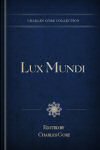
Lux Mundi is a collection of essays that attempt to deal with challenges raised for classic Christian doctrine by discoveries in modern science, linguistics, and biblical studies. Gore contributed the essay “The Holy Spirit and Inspiration.” Other essays include:
- “Faith” by H. S. Holland
- “The Christian Doctrine of God” by Aubrey Moore
- “The Problem of Pain: Its Bearing on Faith in God” by J. R. Illingworth
- “The Preparation in History for Christ” by E. S. Talbot
- “The Incarnation in Relation to Development” by J. R. Illingworth
- “The Incarnation as the Basis of Dogma” by R. C. Moberly
- “The Atonement” by Arthur Lyttelton
- “The Church” by W. Lock
- “Sacraments” by F. Paget
- “Christianity and Politics” by W. J. H. Campion
- “Christian Ethics” by R. L. Ottley
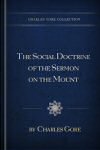
In this brief treatise, Charles Gore explores the question of the New Testament’s authoritative teaching on social morality. Gore does this by focusing on the Sermon on the Mount as recorded in the book of Matthew, arguing that it supplies “the fundamental moral law of our Lord’s kingdom.”
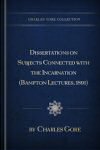
Delivered as part of the Bampton Lectures in the University Church of Oxford during Lent in 1891, Dissertations on Subjects Connected with the Incarnation lays out Gore’s understanding of the Incarnation in light of modern textual criticism. Gore essentially defends the classical understanding of the doctrine, with one important deviation. Gore espouses a kenotic (from the Greek word for “emptying”) understanding of the Incarnation. The concept is taken from Paul’s use of the word kenosis in Philippians 2:7, where he says that Christ “emptied himself, and took the nature of a servant.” Gore argued that Christ, though still God, had given up some of the qualities of the godhead when he became man. This is especially true as it concerns knowledge. When Jesus spoke of such things as the flood or Mosaic authorship of the Pentateuch, he was speaking with limited, human knowledge and could therefore be incorrect or mistaken. Gore also deals with other topics, such as the Virgin Birth and Transubstantiation.
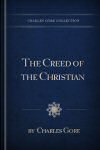
In The Creed of the Christian, Gore explores and explains the tenets of Christian belief as laid out in the Apostles’ and Nicene Creeds. He goes through belief in God as Father, the Holy Trinity, the Incarnation, the Atonement, the Holy Spirit, Scripture, the Church, etc. In this book, Gore hopes to communicate three aspects of these tenets of Christian belief.
- That they are true and can be proclaimed on reasonable grounds
- That they have a direct application in human life
- That they should commend themselves to a (good) man’s conscience
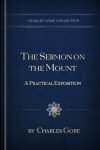
In the preface, Gore says that The Sermon on the Mount: A Practical Exposition is “intended simply to assist ordinary people to meditate on the Sermon on the Mount in the Revised Version, and to apply its teaching to their own lives.” As such, the book is geared toward practical and devotional reflection rather than scholarly study.
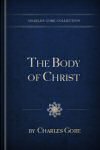
The Body of Christ is “an enquiry into the institution and doctrine of Holy Communion.” In the book, Gore examines the Gospel passages that concern the Last Supper and explores their implications for a proper understanding of the Eucharist. Gore looks at the meaning of sacrament and the relationship between the physical and the spiritual. He then examines the nature of the “real presence,” exploring particularly the Roman Catholic doctrine of transubstantiation. Gore explores the meaning of the Eucharist as a sacrifice. He closes the volume with an examination of the communion service as laid out in the Book of Common Prayer.
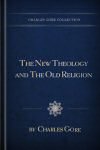
The New Theology and the Old Religion is eight lectures and five sermons that discuss the New Theology School of some of Gore’s contemporaries. The book compares the tenets of the New Theology to the classic teachings of the church and to the faith as it is revealed in Scripture. Though Gore believes that the New Theology is an important development for the faith, ultimately, he argues, it is in conflict with classic Christian doctrine.
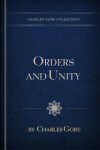
Orders and Unity is Gore’s defense of Apostolic Succession and the episcopal structure of the Anglican Church. He argues that this structure is essential to right doctrine and practice. By ignoring or downplaying this aspect of their faith, says Gore, Christians are ignoring “a fundamental law of the church’s corporate and continuous life.”
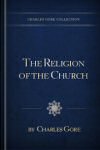
The Religion of the Church is a manual for membership in the Anglican Church. Its purpose is to teach members of the Anglican Church the doctrines of historic Christianity, specifically as they are understood in the worshiping life of the Church of England.
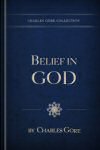
Belief in God lays out Gore’s understanding of what it is that he believes about God and why he believes it. It is the first of three in Gore’s Reconstruction of Belief series, which seeks to offer a positive account of Christian belief. Gore is seeking to show that the historical Christian faith is rational. A rational system of belief, says Gore, must be able to “account for the relevant experience in its widest sense, and the facts of nature and history, better than any other theory; and the best way to test the ability of any theory to do this is not mainly by attacking other theories, but by approaching the facts constructively and critically and seeing what theory appears to emerge out of their free consideration.”
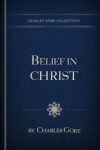
The second in the Reconstruction of Belief series, Belief in Christ examines what Christians believe about Jesus Christ and why. Gore does this by relying on reason without reference to the authority of the Church or the Bible.
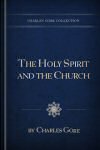
The final book in the Reconstruction of Belief series, The Holy Spirit and the Church, examines Christian belief about the church, as inspired by the Holy Spirit, as Christ’s continued representative on earth. Whereas in the first two volumes Gore didn’t reference the teachings of the church or the Bible, here Gore examines them in detail, showing how they form part of Christian belief.
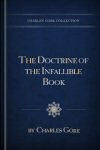
The Doctrine of the Infallible Book
- Author: Charles Gore
- Publisher: George H. Doran Co.
- Publication Date: 1932
- Pages: 63
In The Doctrine of the Infallible Book, Gore argues that the admission of a critical view of Scripture—that there may be errors in the text—is not a threat to the historic Christian beliefs. Rather, says Gore, in many cases criticism of the text can strengthen one’s faith and enthusiasm.
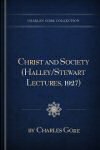
Christ and Society (Halley Stewart Lectures, 1927)
- Author: Charles Gore
- Publisher: Charles Scribner’s Sons
- Publication Date: 1928
- Pages: 228
In Christ and Society, Gore challenges the lack of Christian values among his fellow men. He argues that “the present condition of our society, our industry and our international relations, though it presents encouraging features, yet, on the whole, must inspire in our minds a deep sense of dissatisfaction and alarm, and a demand for so thorough a reformation as to amount to a revolution.” Gore encourages his fellow Christians to take the teachings of Christ and apply them to the world around them. He argued that to follow Christ is to fight for justice and peace and to stand for the freedom of all human beings.
Charles Gore (1853–1932) was born in Wimbledon, London. He attended Balliol College, Oxford, graduating with honors in classics and philosophy. In 1875, he accepted a fellowship at Trinity College, Oxford; he was ordained in the Church of England three years later. In 1883, Gore became the first principal of the newly established Pusey House, a library and study center named for the Anglo-Catholic scholar Edward Pusey. Four years later, in 1887, Gore founded the Community of the Resurrection—a religious society for priests modeled on monastic society. In 1902, Gore was named the bishop of Worcester, and in 1905, he became bishop of the newly created diocese of Birmingham. He transferred to the diocese of Oxford in 1911, an office he held until he retired in 1919. He began lecturing in theology at King’s College, Oxford, and later became the dean of the Faculty of Theology at University of London. During this period, he travelled throughout the world preaching and lecturing. In 1930, he went on a preaching tour through India and returned quite ill. He died in 1932.